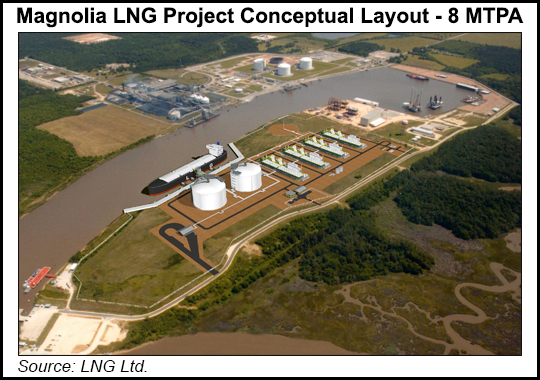NGI The Weekly Gas Market Report | Infrastructure | LNG | LNG Insight | NGI All News Access
Magnolia LNG Developer Mulling Buyout by Singapore Firm
Citing “intense” competition in the race to export liquefied natural gas (LNG) and an urgent need to secure liquidity, Australia-based LNG Ltd. (LNGL) is considering a takeover offer from a private Singapore-based firm that would include two proposed projects for the Gulf Coast and Canada.

In a quarterly activity report released in December, LNGL management indicated it recognized the need for “immediate new sources of liquidity” and said it was “evaluating several strategic options.”
Under a bid implementation agreement launched by LNG9 Pte. Ltd., which owns and operates offshore regasification facilities in Asia and Europe, shareholders would receive 13 cents/share (or the Australian dollar equivalent) in cash, valuing LNGL capital at around $75 million. The offer represents a 72% premium to the share closing price on the Australian Securities Exchange on Feb. 27, the trading day before the announcement.
“LNGL has over the last year evaluated many potential corporate and asset transactions to provide liquidity and value for shareholders and considers that the LNG9 offer is the most attractive offer currently available for LNGL shareholders,” CEO Greg Vesey said.
The deal could be completed in early May, pending shareholder approval.
First Wall Street Capital Corp. has agreed to provide bridge financing to LNGL for ongoing marketing and development, as well as working capital requirements. Vesey said LNGL’s existing available liquidity is “insufficient to sustain operations” beyond March based on existing funds, or beyond 3Q2020 including the bridge financing facility.
LNGL is working to get projects off the ground while the global market is awash in supply and buyers are unwilling to sign long-term supply deals. Despite having all permits in hand, securing binding offtake agreements has been a struggle for the proposed Magnolia LNG terminal near Lake Charles, LA, and the Bear Head LNG facility in Nova Scotia.
LNGL last September signed a memorandum of understanding (MOU), still not finalized, to sell 25% of the capacity at the Magnolia facility to Singapore’s Delta Offshore Energy Pte Ltd. Delta, under the MOU, tentatively would receive about 2 million metric tons/year on a free-on-board basis for at least 20 years to fuel a power plant in Vietnam. However, other commercial efforts have fallen short.
Vesey said LNG industry competition “remains intense” and that current markets are oversupplied. “While LNGL is excited by the LNG supply opportunity in Vietnam,” and the expectation that the MOU will become binding, “we cannot assure additional binding offtake contracts necessary to support a final investment decision (FID) and financial close given current LNG market conditions.”
Vesey has been candid about the struggles in landing buyers. In 2018, the company chief cited the U.S.-China trade war in the decision to delay FID on the Magnolia facility, and he reaffirmed “the market is still very tough” in remarks last fall at the North American Gas Forum.
Last week, Pembina Pipeline Corp. management said it remained committed to the proposed Jordan Cove LNG facility in Coos Bay, OR, despite continued regulatory uncertainty. However, Pembina also is exploring other opportunities in British Columbia (BC).
FERC late last month set aside a motion to authorize the 1.04 Bcf/d Jordan Cove export project but it was not a denial. The Federal Energy Regulatory Commission’s decision came one day after Oregon regulators denied a key approval for the facility. Pembina management expects a decision by March 20, when the Commission is scheduled to meet again.
Pembina has the opportunity to “benefit our customers, the province and indeed the country while playing an important role” in reducing greenhouse gas emissions by displacing coal demand abroad, CEO Mick Dilger said on a fourth quarter earnings call. “We want to be in the LNG business, and we are currently working on several opportunities, including locations in Northeast BC as well as continuing to progress our proposed Jordan Cove project.”
The FERC approval would build momentum for the Jordan Cove project with the state, according to Dilger, and “the scarcity of that project…still intrigues us. We’re going to stick with it because our cost to stick with it is nominal, and it has huge upside. The math is pretty easy. We’re going to methodically move that one forward.”
Senior Vice President Stu Taylor of Marketing and New Ventures & Corporate Development said the company is working with Oregon’s regulatory process. “We’re continuing to progress as best we can and continue to move things forward and are looking forward to making progress on receiving some of those permits.”
At the same time, the company also is making progress in BC, where “there’s attributes of lower risk with some existing projects that are appealing,” according to Dilger. “But those are not free.” The opportunities are being reviewed, but “this is going to be a long-term process. I’m not aware of any major infrastructure projects in Canada or for that matter, anywhere on the West Coast of the U.S. that gets done quickly. We’re just laying the groundwork now because it just takes that long.”
© 2024 Natural Gas Intelligence. All rights reserved.
ISSN © 1532-1231 | ISSN © 2577-9877 | ISSN © 1532-1266 |
